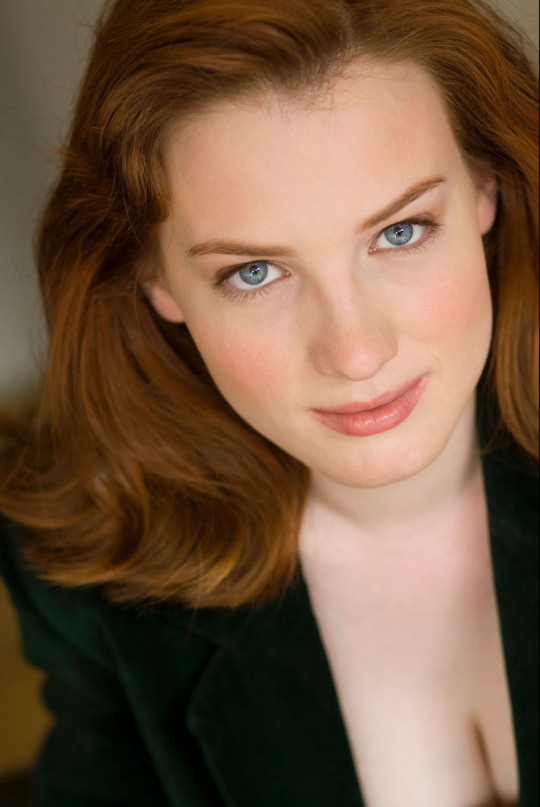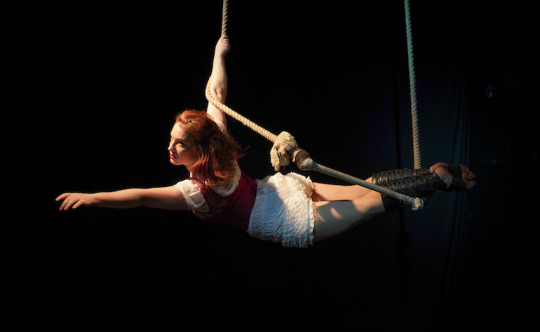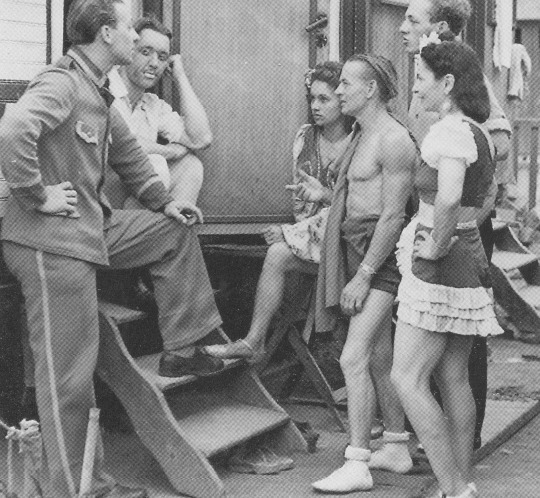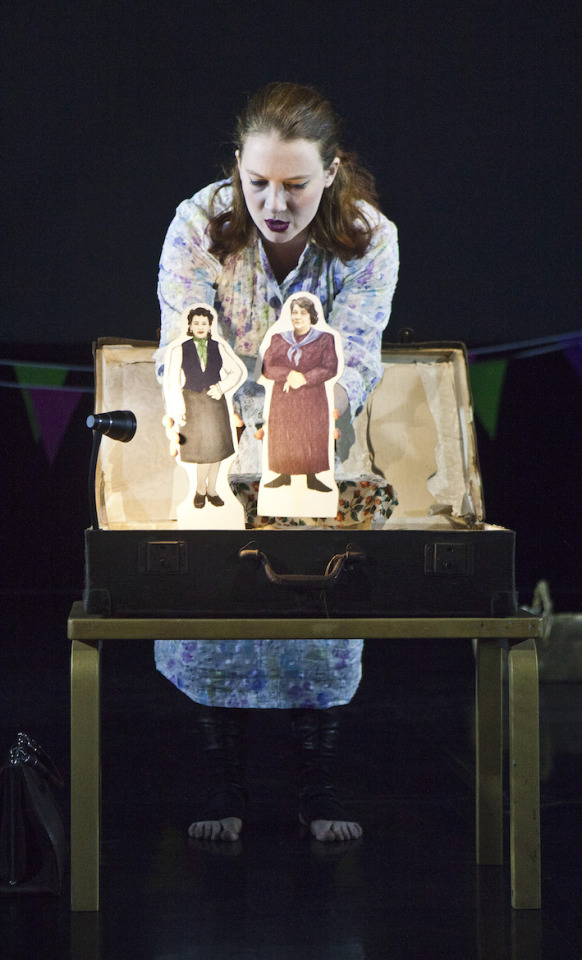#stav meishar
Explore tagged Tumblr posts
Text
Get your event or classroom some queer Jewish content
If you are ever arranging something that needs a speaker and queer Jewish themes in media, theatre, circus, etc would be a good fit, I highly recommend Stav Meishar.
And if you are ever arranging anything in a theatre or circus-like space, book one of her shows, The Escape Act is incredible.
5 notes
·
View notes
Link
Stav is incredible, so I really recommend anyone who can make it at that time (4 March 2021, 2pm New York -time) to join this free webinar.
#jewish history#circus history#circus jews#holocaust#shoah#world war 2#world war ii#stav meishar#irene danner
4 notes
·
View notes
Text
Stav Meishar, multi-disciplinary performer and creator – The Escape Act: A Holocaust Memoir
Stav Meishar – a stage artist who mixes theatre, circus, music, dance, poetry and puppetry – was born and raised in Tel Aviv in Israel. She attended the Thelma Yellin High School of the Arts and has worked professionally as an actress since childhood, notably starring in Wicked’s original Israeli cast.

After moving to the US in 2008, Stav has performed internationally in Hebrew, English and Yiddish. In 2012 she founded Petit Mort Productions to provide an outlet for multi-disciplinary artists whose works are “innovative, unique and perhaps a bit strange”. In 2013, her play The Dreamer and the Acrobat ran at the NY Frigid Festival, and she made her circus debut on silks in the Off-Broadway revival of The Megile of Itzik Manger.
Stav is now based in Bristol and this month embarks on a UK tour of her solo show The Escape Act: A Holocaust Memoir, which is based on the life of Jewish-German circus artist Irene Danner. Stav chats to Liz Arratoon in the run-up to its UK premiere at Jacksons Lane in London on 23 September 2019.
The Widow Stanton: Is there any showbusiness in your background? Stav Meishar: Almost everybody in my family is in love with the arts but nobody else makes it. Everybody does other things around it. My mother is an arts critic, lecturer and guide. She knows everything there is to know about arts but when I asked her if she ever wanted to make any, she said: “Heavens, no!” My dad owns a business he funded… it’s kind of hard to explain but it’s like an archive of Israeli folk dancing. So ever since I was little whenever a new Israeli folk dance would be created, he’d get the choreographer and a bunch of volunteer dancers and videotape it, with instructions, so that enthusiasts around the world can learn how to dance.
How did you start performing so young? I’ve always loved attention [laughs]. There’s video tapes of me when I’m two or three years old doing, like, hand puppetry. Not with actual puppets, just with my hands. I think it was a Mr and a Mrs who met at a movie theatre and fell in love. It was always something I wanted and I used to scour the newspapers when I was little for audition notices. So when there was one for an Israeli production of Oliver Twist I figured, why not be an orphan? [Laughs]

So you just auditioned and got the part? Yep! The production was first in Tel Aviv. There’s a big tradition in Israel on Hanukkah to have shows for the family because everyone’s off from school and the parents are going crazy trying to find something different for the kids. I was… 11, I think, and then the following year it toured all around Israel. I had a lovely time.
What happened about your schoolwork and all that boring stuff? If I remember correctly, the rehearsals were about a half-hour bus ride from my school and I had to get special permission to leave the last class a bit early, so that I could make it on time. All the kids were really mean to me about it: “Oh, you know, she’s hoity-toity with her rehearsals.” I’d rehearse every day and get home at about 7pm.
But being on tour… I think because Israel is so small it’s a bit different to what we think of as tours in the UK or US. There were about 50 kids in the cast so the production would hire a bus and I think there was at least one adult from the production with us.
Was the Thelma Yellin school like a Fame school or something? [Laughs] It’s pretty much what you imagine when you think of a performing arts school; a little bit like Fame. It’s a great school in Israel that still exists and has a great reputation. All the students have to be good at all the regular subjects. You can’t slack off in any of that but you also have to choose one of six artistic majors: theatre, classical music, jazz, cinema, visual arts and dance. So mine was theatre. I was there from 14 to 18.

Why did you move to the US? I always wanted to be in musical theatre, and originally the dream was London. I got accepted at a few schools here but none of them had international scholarships. There was a lot of crying and sadness around that [laughs] and then I picked myself up by the bootstraps and figured, ‘Well, I’ve got to come up with a plan B’, and I got accepted to a musical theatre programme in New York at the American Musical and Dramatic Academy that did have quite a generous international student scholarship.
I worked my arse off for about two years saving every shekel I could and got some help from my parents as well, God bless them, and yes, I moved to the States and studied musical theatre. I graduated and worked in professional musical theatre in New York for about a year and then one day I woke up and realised, ‘I hate it!’. Not musical theatre, I still love that, but the business around it; how mean everybody is and how soul-crunching open calls are. I couldn’t do it anymore.
This crisis was in about 2010 and I was in a really dark place for a while and decided, ‘I’m just going to see as much theatre and performing arts as I can and see if I can get inspired by any of it, and take as many classes as I can in all kinds of different things’. So I took yoga, and I took Pilates and all kinds of stuff… and I took a silks class and uh… well… yeah, fell in love. [Laughs]
Where did you learn your circus skills? I trained for a long time at the Circus Warehouse in New York, which is a fantastic space with really high-level professional training. It’s not a university, it’s not accredited, but the level is super high and the coaches are all fantastic.

I see also you play ukulele and do poi spinning… have you got anything else up your sleeve? I had a year or two of trying a bunch of different things. I still play the ukulele mostly for my own pleasure. I took a street show to the Edinburgh Fringe for a couple of years where I put together Shakepearean monologues with whatever was popular that day on MTV, on the ukulele. So Taming of the Shrew and how badly he treats her, how awful he is leading into Bad Romance by Lady Gaga. That was fun for a little while.
Oh, and poi spinning… I do a lot of things none of them in any way as professional as I do theatre. You can’t do too many things well. You do a lot, you end up being OK at most of them. I’m skilled in a lot of things but wouldn’t consider myself expert in all of them. Theatre is where I’m most confident… history, specifically World War II history is something I’m very confident in, and Jewish education is something I feel an expert on. Circus is always a tricky thing because I’ve been doing it long but I have never done it with enough… let’s put it that way, I started late and I’m lazy.
Have you done stuff at Circomedia, being in Bristol? Yeah, I just did one year full time there, basically shadowing their foundation degree students doing all the practical stuff but none of the academic stuff, because I already have my degree. It sounds much more than I’m capable of. Yes, I just graduated from a full-time programme; I’m still pretty shit at circus but I never intended, like, I don’t market myself as an acrobat. I’m a multidisciplinary artist who has a lot of tools and because this current project is about a circus artist, I had to have some circus skills thrown into the melting pot of the show, but I’ve been really adamant with everybody where I’m performing, don’t market it as circus show or people will be really disappointed. It’s a theatre show. It has puppetry, it has circus but I’m no more a circus acrobat than I am a puppet master.

So let’s talk about The Escape Act. How did it come about? It was completely random. I started my Jewish education company, Dreamcoat Experience, and our niche, so to speak, was teaching progressive Jewish education using performing arts: drama, music, puppets, thing like that, and I started weaving circus methods into our curriculum. I was curious if anyone had done that before and I went to Google and I typed in ‘Circus Jews’ and one of the first things to come up was the New York Times obituary for Adolf Althoff, the German circus owner who saved this Jewish family. I just remember reading it and my jaw dropping to the floor going, ‘How is there not a movie about this?’. It was incredible. I just started going into this Alice in Wonderland rabbit hole from which I never emerged.
You’ve written about Irene Danner’s story for Circus Talk, but give us a brief outline of her story. In seven years of research, I uncovered a lot and it’s a big story. The short of it is, Irene, born Danner, was a descendent of the Lorch family, Jewish Circus royalty; they were the most famous Risley act of their time. They performed with the Ringling Brothers in America, they went on tour with Circus Sarrasani in South America, they really were the celebs of their time. The circus closed when she was about seven years old; they went bankrupt around 1930 with the rise of anti-semitism and people not really wanting to see ‘the Jew circus’ anymore.
Irene trained as a acrobat from when she was little and got her first job when she was 13, with Circus Busch. She was the flyer for the horse-riding troupe The Carolis and was there for three years until the law changed and Jews weren’t allowed to work anymore. About three years later she went to see the Circus Althoff and fell in love with their clown, Peter Bento. Peter asked Adolf if he would give her a job. Adolf knew it wasn’t legal but he didn’t really give a shit, excuse the language. That’s his, not mine. She was not allowed to marry Peter because of the racial laws of the time but they had two kids during the war and three more afterwards.

At some point when the Jews were starting to get deported, she persuaded Mr Althoff to let her family join as well; so her sister and her parents, and all four of them survived the war. Other members of her family didn’t make it. If you visit their house there are a few stumbling stones outside for all those who perished. The idea is that you shouldn’t just be reminded of the Holocaust when you decide to be by going to a memorial, but that you stumble upon them.
The Escape Act is as faithful to the story as I could make it but I took some artistic liberties. For example, she joined the Althoff circus because she fell in love, but in the show I’ve made it that she joins because she misses performing and she wants to do what she loves. It’s a bit of a feminist twist; she’s making her own path.
So in the show, you’re doing a bit of trapeze and juggling but it’s a theatre show? It is definitely a theatre show. It’s quite text heavy.
How did you go about your research? I started at the Yad Vashem Museum – the big Holocaust museum in Israel – because the obit mentioned that Adolf Althoff and his wife Maria, had received the honour of the title ‘The Righteous Among the Nations’ from Yad Vashem, which is a special sort of order, I guess, for Gentiles who saved Jews during World War II. As they’d given them this honour I assumed they’d have files on them and indeed they had.
They had interviews with both Adolf and Irene… photos… and then I just started visiting museums, archives, libraries, just picking information wherever I could, speaking to whoever I could. I wish I spoke German; my research would have been so much better. A lot of my info came from a wonderful book called Jewish Identities in German Popular Entertainment. It’s the only English book available that talks about circus performers in Germany during that era. Of course I looked at the bibliography and saw where I could branch off from there.

One of the books I got in German is this tiny little book that’s all interviews and testimonies from Irene, her husband, Adolf, basically everybody involved. I crowd-sourced the translation. I just reached out on Facebook and got something like ten German speakers to translate two chapters each voluntarily. So I got the whole book translated out of the goodness of their hearts. One of my favourite things described was the friendship that Irene and her husband had with a Moroccan acrobat called Mohammed; Muslim, of course, and being Jewish, I was like, yes, Jewish/Muslim friendship, yay! He was their best friend during the war and he helped hide them, he protected them, they were really each other’s backbone.
Years later when I went to Irene’s town and interviewed her kids, who are now in their seventies, I asked them if they were still in touch with any of the saviours. Her eldest son was like: “Ja, ja, we still speak, Christmas cards, birthday cards, but the one we are really in touch with, we speak every week on the phone, is Uncle Momo.” It just took me a second… I’m like, ‘Do you mean Mohammed?’. He goes: “Yes, yes, he lives in Tangier now.” ‘I’m sorry, is he still alive?’. “Yes, he just celebrated his 94th birthday.”
It was just incredible! So here I am in a living room in Germany, learning that there’s one person still alive from that era, and here’s the real amazing thing… this was in May and in June my husband and I were booked on our honeymoon, guess where? Morocco! That was incredibly random. It was meant to be. I told Irene’s son, ‘It so happens we’re going to Morocco. Will you please connect me with Mohammed?’. So a few weeks later, there we were in his living room in Tangier.

What does it mean to you to be performing the show in Germany on the anniversary of Kristallnacht? I think I’m actually more terrified than honoured, because her kids are probably going to be there and I’m so terrified that they’ll be angry at me for making changes. That’s my own demons and whatnot. I think as an artist it’s something of a trait to imagine a worst-case scenario. It’s something we do to ourselves but I’m sure it will a wonderful experience and hopefully her kids will love it. I did ask for their blessing and they gave it to me.
But just talking to you I get emotional about bringing the show on Kristallnacht because this is where it all took place. Even when I visited there last year it was really emotionally difficult to be in that synagogue where I know Kristallnacht happened, and to be in the family’s home where I know Irene saw her own grandmother being snatched away. In those places there’s a visceral element to being in the spot where it happened. Like visiting Auschwitz is different than reading about it. And there is a scene in the show that takes place on Kristallnacht, so to be at the synagogue where it actually happened, in the town where it actually happened, in front of that family, I mean, it’s… ahh! It’s an incredible gift that they’ve given me to invite me to do my show there.
Do you feel, with the rise of the far right, that your show is even more relevant now and it’s even more important that people should hear this story? Yes, absolutely. It’s been in my mind ever since I started researching this history, and every time I think it’s going to become less relevant, it has to get better from here, it doesn’t. It’s getting worse. Every historian has this feeling of helplessness where you see history repeating itself and yet people do it anyway. Even with Germany and all that history, when I talk politics to people, they’re like: “Oh, but it’s getting better now. Gays have the right to marry, trans people are accepted.” But if you look at history, the Weimar Republic happened right before the Nazi regime. They had, like, the biggest gay parties, they had cross-dressers, they had cabarets, they had this amazing period of artistic and sexual liberation and then this happened. I’m not sure that an improvement necessarily says an upward motion.
When I first starting working on the show the thing I really kept thinking about was how the Holocaust was taught to me. Growing up in Israel it’s a big subject in our curriculum. We study it, I dare say, a bit too early, but one of the most powerful experiences that I had growing up and that I saw as a Jewish educator in America is that schools would bring survivors to tell their stories first hand. And that’s always been for me and my students the most powerful experience, more than watching movies, more than seeing pictures of naked skinny bodies. Just having a person there telling you this is what happened, this is what they did to me, to my sister, to my parents, it’s different. And it’s a resource that’s not going to be available forever. Survivors are dying out and the thought that led me in this work is, ‘OK, what experience can I create that would get as close to a first-hand telling as possible?’.

I’d like to think this show is a good alternative. It’s not perfect, it’s never going to replicate that, but telling a story in the first person as if it were my story and taking those moments of stepping away from the character, and being myself and telling my own experiences, more about the after-effects it has, I think that’s powerful for everyone. What’s it like for someone who is descendent of refugees from a genocide? How does that affect you? Here’s this person who was never in the camps, who never starved and who had a pretty cushy, privileged life and yet there’s this scar that was her inheritance, and it’s never going to go away.
Would you say this show is the highlight of your career so far? It’s definitely the most ambitious project I’ve taken. I’ve been a performer for most of my life but I’ve always interpreted other people’s work. That’s what actors do, and this is not the first time I’m doing my own project but it’s the first time I’m doing, first of all a project that I’ve vested so much time and effort in, but it’s also the first project that has autobiographical elements. So the show I would say is 95 per cent Irene’s story but the rest is me and my history.
The way it’s structured is when there are points when her experiences sort of trigger my own memories growing up, I take a step out of Irene and become myself, the house lights go up and I talk to the audience about my own experiences. It’s a wonderful thing as an artist to be able to share that sort of vulnerability with an audience, and it’s absolutely terrifying and it’s difficult. It’s so raw and it’s weird because those things haven’t happened to me. I’m telling the stories of my ancestors and still, yeah, it’s right there in the really innermost parts.
vimeo
Stav Meishar performs The Escape Act: A Holocaust Memoir at Jacksons Lane in London on 23 and 24 September 2019, before a UK tour.
Picture credits: Michael Blase; Asaf Sagi; Kati Rapia: Shirin Tinati: Gilad Kfir
For Jacksons Lane tickets, click here
For tour dates, click here
Stav’s website
Twitter: @stavmeishar
Follow @TheWidowStanton on Twitter
#stav meishar#the escape act#holocaust#theatre interview#jacksons lane#circus#aerialist#jewish artist#yad vashem
1 note
·
View note
Link
If you are anywhere near South West of England, go see The Escape Act! It is absolutely fantastic, it’s a single-performer circus play about Irene Danner, a Jewish circus performer who survived the Holocaust by hiding at a German circus.
4 notes
·
View notes
Text
"The Barbette Project" adapts the true story of Barbette, a legendary gender-bending trapeze artist, as woven with the lived experiences of LGBT+ circus artists today.
This show is currently being researched and devised by Stav Meishar and a small team of LGBT+ artists. We're looking at how concepts of gender set by society are affecting us and trying out different exercises to explore these themes, drawing on our own experiences as well as survey responses we’ve collected from LGBT+ people, particularly those in the circus industry.
The result will be what we call "open source play" - a road map, a script that leaves space for any performer (or multiple!) to combine their personal history with Barbette’s story. Any performer who relates to these themes could use our “open source play” to make a show that’s totally unique to them.
Sunday December 19th is Barbette's birthday. Join us on ZOOM for free for a birthday party to launch "The Barbette Project".
Find more details at the Facebook event.
9 notes
·
View notes
Video
vimeo
#stav meishar#the escape act#a holocaust memoir#jewish#circus#performer#show#act#play#one-woman show#puppetry#trapeze
3 notes
·
View notes
Link
This is a fantastic opportunity, a free online talk with Stav Meishar, who is doing a fabulously cool project and research into Jewish circus performers in Nazi Germany. I really really recommend registering and “attending” this.
44 notes
·
View notes
Link
New London Synagogue is hosting a public ZOOM talk by Stav Meishar on Wednesday July 1st, and tickets are now on sale.
"Circus Jews Under National Socialism" explores the true stories of Jewish circus artists, told with sensitivity and humor by Stav Meishar, a circus artist and academic.
“The talk is based on over 7 years of extensive research, and combines photos from personal albums, recorded testimonies, and personal stories. Together we will examine the incredible histories of Jewish circus artists in Germany from 1880-1945.
“Meishar weaves the historical information with excerpts from her show "The Escape Act" and discusses the unique challenges of transforming historical events into performance.“
I have seen The Escape Act when it premiered in Loviisa, and I’ve worked with Stav and I really really recommend checking this out.
2 notes
·
View notes